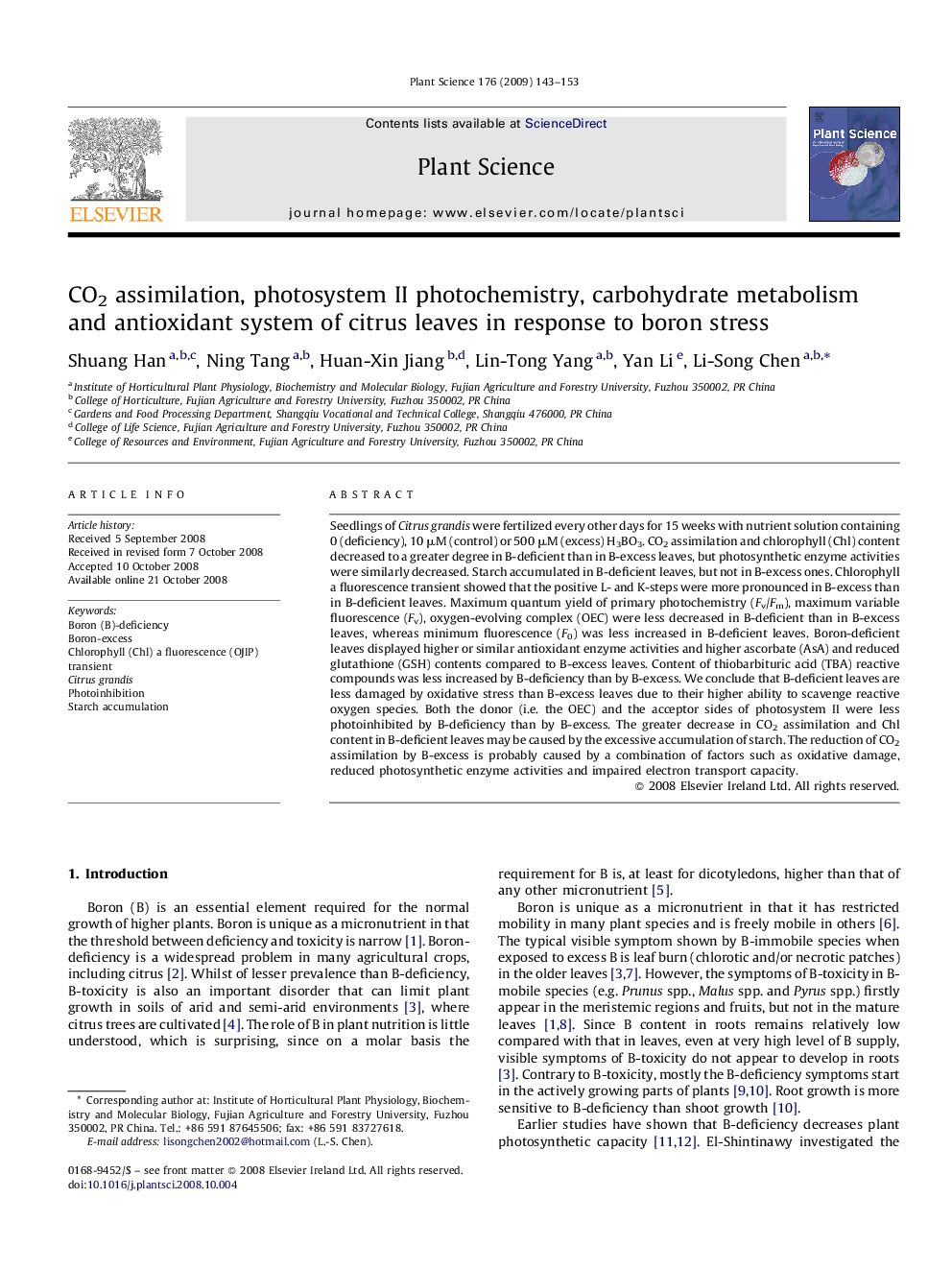| کد مقاله | کد نشریه | سال انتشار | مقاله انگلیسی | نسخه تمام متن |
|---|---|---|---|---|
| 2018044 | 1067831 | 2009 | 11 صفحه PDF | دانلود رایگان |
عنوان انگلیسی مقاله ISI
CO2 assimilation, photosystem II photochemistry, carbohydrate metabolism and antioxidant system of citrus leaves in response to boron stress
دانلود مقاله + سفارش ترجمه
دانلود مقاله ISI انگلیسی
رایگان برای ایرانیان
کلمات کلیدی
موضوعات مرتبط
علوم زیستی و بیوفناوری
علوم کشاورزی و بیولوژیک
دانش گیاه شناسی
پیش نمایش صفحه اول مقاله

چکیده انگلیسی
Seedlings of Citrus grandis were fertilized every other days for 15 weeks with nutrient solution containing 0 (deficiency), 10 μM (control) or 500 μM (excess) H3BO3. CO2 assimilation and chlorophyll (Chl) content decreased to a greater degree in B-deficient than in B-excess leaves, but photosynthetic enzyme activities were similarly decreased. Starch accumulated in B-deficient leaves, but not in B-excess ones. Chlorophyll a fluorescence transient showed that the positive L- and K-steps were more pronounced in B-excess than in B-deficient leaves. Maximum quantum yield of primary photochemistry (Fv/Fm), maximum variable fluorescence (Fv), oxygen-evolving complex (OEC) were less decreased in B-deficient than in B-excess leaves, whereas minimum fluorescence (F0) was less increased in B-deficient leaves. Boron-deficient leaves displayed higher or similar antioxidant enzyme activities and higher ascorbate (AsA) and reduced glutathione (GSH) contents compared to B-excess leaves. Content of thiobarbituric acid (TBA) reactive compounds was less increased by B-deficiency than by B-excess. We conclude that B-deficient leaves are less damaged by oxidative stress than B-excess leaves due to their higher ability to scavenge reactive oxygen species. Both the donor (i.e. the OEC) and the acceptor sides of photosystem II were less photoinhibited by B-deficiency than by B-excess. The greater decrease in CO2 assimilation and Chl content in B-deficient leaves may be caused by the excessive accumulation of starch. The reduction of CO2 assimilation by B-excess is probably caused by a combination of factors such as oxidative damage, reduced photosynthetic enzyme activities and impaired electron transport capacity.
ناشر
Database: Elsevier - ScienceDirect (ساینس دایرکت)
Journal: Plant Science - Volume 176, Issue 1, January 2009, Pages 143-153
Journal: Plant Science - Volume 176, Issue 1, January 2009, Pages 143-153
نویسندگان
Shuang Han, Ning Tang, Huan-Xin Jiang, Lin-Tong Yang, Yan Li, Li-Song Chen,